technology
-
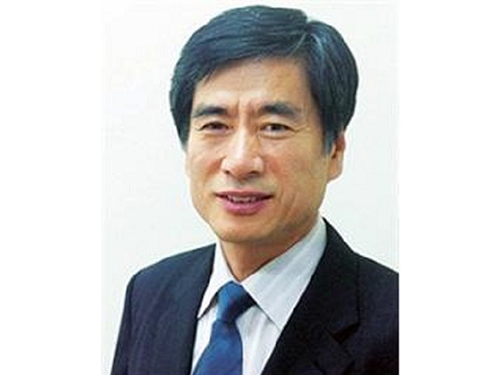 A KAIST Alumnus Is Appointed the President of Seoul National University of Science and Technology
Jong-Ho Kim, graduated from the master’s program in the mechanical engineering department of KAIST in 1980, has been appointed the 11th president of Seoul National University of Science and Technology (SeoulTech) on November 9, 2015.
Upon receiving his doctoral degree in production engineering from KAIST in 1986, President Kim began his career as a professor at SeoulTech. He served in many senior posts at the university including Dean of Planning and Academic Affairs, and of the Engineering College.
2015.11.15 View 5420
A KAIST Alumnus Is Appointed the President of Seoul National University of Science and Technology
Jong-Ho Kim, graduated from the master’s program in the mechanical engineering department of KAIST in 1980, has been appointed the 11th president of Seoul National University of Science and Technology (SeoulTech) on November 9, 2015.
Upon receiving his doctoral degree in production engineering from KAIST in 1986, President Kim began his career as a professor at SeoulTech. He served in many senior posts at the university including Dean of Planning and Academic Affairs, and of the Engineering College.
2015.11.15 View 5420 -
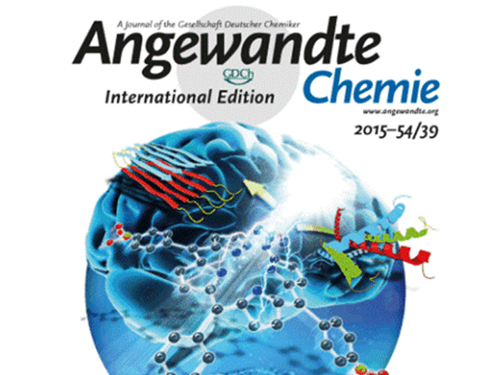 Using Light to Treat Alzheimer's Disease
Medical application of photoactive chemicals offers a promising therapeutic strategy for neurodegenerative diseases.
A research team jointly led by Professor Chan Beum Park of the Materials Science and Engineering Department at KAIST and Dr. Kwon Yu from the Bionano Center at the Korea Research Institute of Bioscience and Biotechnology (KRIBB) conducted research to suppress an abnormal assembly of beta-amyloids, a protein commonly found in the brain, by using photo-excited porphyrins.
Beta-amyloid plaques are known to cause Alzheimer's disease. This research finding suggests new ways to treat neurodegenerative illnesses including Alzheimer's disease. It was published online as the lead article in the September 21th issue of Angewandte Chemie. The title of the article is “Photo-excited Porphyrins as a Strong Suppressor of ß-Amyloid Aggregation and Synaptic Toxicity.”
Light-induced treatments using organic photosensitizers have advantages to managing the treatment in time and area. In the case of cancer treatments, doctors use photodynamic therapies where a patient is injected with an organic photosensitizer, and a light is shed on the patient’s lesion. However, such therapies had never been employed to treat neurodegenerative diseases.
Alzheimer's starts when a protein called beta-amyloid is created and deposited in a patient’s brain. The abnormally folded protein created this way harms the brain cells by inducing the degradation of brain functions, for example, dementia. If beta-amyloid creation can be suppressed at an early stage, the formation of amyloid deposits will stop. This could prevent Alzheimer’s disease or halt its progress.
The research team effectively prevented the buildup of beta-amyloids by using blue LED lights and a porphyrin inducer, which is a biocompatible organic compound. By absorbing light energy, a photosensitizer such as porphyrin reaches the excitation state. Active oxygen is created as the porphyrin returns to its ground state. The active oxygen oxidizes a beta-amyloid monomer, and by combining with it, disturbs its assembly.
The technique was tested on drosophilae or fruit flies, which were produced to model Alzheimer on invertebrates. The research showed that symptoms of Alzheimer's disease in the fruit flies such as damage on synapse and muscle, neuronal apoptosis, degradation in motility, and decreased longevity were alleviated. Treatments with light provide additional benefits: less medication is needed than other drug treatments, and there are fewer side effects. When developed, photodynamic therapy will be used widely for this reason.
Professor Park said, “This work has significance as it was the first case to use light and photosensitizers to stop deposits of beta-amyloids. We plan to carry the research further by testing compatibility with other organic and inorganic photosensitizers and by changing the subject of photodynamic therapy to vertebrate such as mice.”
Picture 1 – Deposits of Beta-Amyloid in Fruit Flies Stopped by Using Porphyrin and Blue LED Lights
Picture 2 – The Research Finding Published as the Lead Article in Angewandte Chemie (September 2015)
2015.11.11 View 12075
Using Light to Treat Alzheimer's Disease
Medical application of photoactive chemicals offers a promising therapeutic strategy for neurodegenerative diseases.
A research team jointly led by Professor Chan Beum Park of the Materials Science and Engineering Department at KAIST and Dr. Kwon Yu from the Bionano Center at the Korea Research Institute of Bioscience and Biotechnology (KRIBB) conducted research to suppress an abnormal assembly of beta-amyloids, a protein commonly found in the brain, by using photo-excited porphyrins.
Beta-amyloid plaques are known to cause Alzheimer's disease. This research finding suggests new ways to treat neurodegenerative illnesses including Alzheimer's disease. It was published online as the lead article in the September 21th issue of Angewandte Chemie. The title of the article is “Photo-excited Porphyrins as a Strong Suppressor of ß-Amyloid Aggregation and Synaptic Toxicity.”
Light-induced treatments using organic photosensitizers have advantages to managing the treatment in time and area. In the case of cancer treatments, doctors use photodynamic therapies where a patient is injected with an organic photosensitizer, and a light is shed on the patient’s lesion. However, such therapies had never been employed to treat neurodegenerative diseases.
Alzheimer's starts when a protein called beta-amyloid is created and deposited in a patient’s brain. The abnormally folded protein created this way harms the brain cells by inducing the degradation of brain functions, for example, dementia. If beta-amyloid creation can be suppressed at an early stage, the formation of amyloid deposits will stop. This could prevent Alzheimer’s disease or halt its progress.
The research team effectively prevented the buildup of beta-amyloids by using blue LED lights and a porphyrin inducer, which is a biocompatible organic compound. By absorbing light energy, a photosensitizer such as porphyrin reaches the excitation state. Active oxygen is created as the porphyrin returns to its ground state. The active oxygen oxidizes a beta-amyloid monomer, and by combining with it, disturbs its assembly.
The technique was tested on drosophilae or fruit flies, which were produced to model Alzheimer on invertebrates. The research showed that symptoms of Alzheimer's disease in the fruit flies such as damage on synapse and muscle, neuronal apoptosis, degradation in motility, and decreased longevity were alleviated. Treatments with light provide additional benefits: less medication is needed than other drug treatments, and there are fewer side effects. When developed, photodynamic therapy will be used widely for this reason.
Professor Park said, “This work has significance as it was the first case to use light and photosensitizers to stop deposits of beta-amyloids. We plan to carry the research further by testing compatibility with other organic and inorganic photosensitizers and by changing the subject of photodynamic therapy to vertebrate such as mice.”
Picture 1 – Deposits of Beta-Amyloid in Fruit Flies Stopped by Using Porphyrin and Blue LED Lights
Picture 2 – The Research Finding Published as the Lead Article in Angewandte Chemie (September 2015)
2015.11.11 View 12075 -
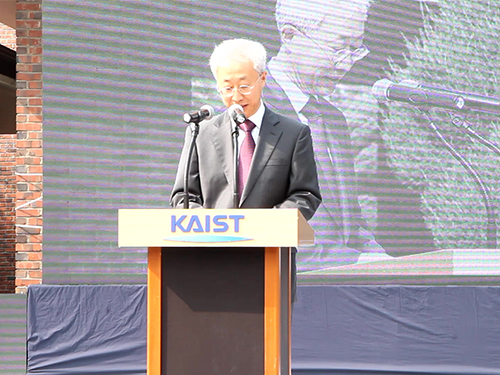 KAIST's Graduate School of Culture Technology Celebrates Its Tenth Anniversary
The Graduate School of Culture Technology (GSCT) at KAIST hosted a ceremony and a variety of events to celebrate its tenth anniversary on October 22, 2015, on campus.
Established in 2005 with the support of the Ministry of Culture, Sports and Tourism of the Republic of Korea, GSCT offers an intensive, in-depth education in culture technology, an interdisciplinary field first introduced in Korea by KAIST, which brings arts, humanities, science, and technology together in an academic and research arena.
Over the years, the graduate school has fostered top-notch researchers and professionals who have played a leading role in the development of a Korean culture contents industry that includes movies, broadcasting programs, music, games, and culture events.
After the anniversary ceremony, GSCT held a "Demo Day" to showcase its major research projects. A total of 41 projects were presented under the themes of “Art and Science,” “Human and Humane,” and “Virtual Reality vs Reality.”
In addition, there was a seminar held on GSTC’s ten-year accomplishment and future planning with the school’s Professors Sunghee Lee, Juyong Park, and Juhan Nam; a cultural event for the public called the “Talk Concert,” which included many professionals in culture industry and academia to share ideas and views; and the Homecoming Day for GSTC graduates. So far, the graduate school has produced 295 masters and 34 doctors. About 34% of its graduates are employed in the movie, game, and broadcasting sectors, 33% in the social networking service and Internet industry, and 33% in performing art and exhibition and event.
Dong-Man Lee, the Dean of KAIST's Graduate School of Culture Technology, said,
“We will continue to develop our school to lead the advancement of the Korean culture industry, contributing to the growth of Korean Wave, the popularity of Korean culture, in the global community.”
In the picture below, Dean Lee delivers a speech to celebrate the school’s tenth anniversary.
Soo-Man Lee, the founding chairman of S.M. Entertainment, speaks at the Talk Concert.
Scenes from the Demo Day
2015.10.26 View 9324
KAIST's Graduate School of Culture Technology Celebrates Its Tenth Anniversary
The Graduate School of Culture Technology (GSCT) at KAIST hosted a ceremony and a variety of events to celebrate its tenth anniversary on October 22, 2015, on campus.
Established in 2005 with the support of the Ministry of Culture, Sports and Tourism of the Republic of Korea, GSCT offers an intensive, in-depth education in culture technology, an interdisciplinary field first introduced in Korea by KAIST, which brings arts, humanities, science, and technology together in an academic and research arena.
Over the years, the graduate school has fostered top-notch researchers and professionals who have played a leading role in the development of a Korean culture contents industry that includes movies, broadcasting programs, music, games, and culture events.
After the anniversary ceremony, GSCT held a "Demo Day" to showcase its major research projects. A total of 41 projects were presented under the themes of “Art and Science,” “Human and Humane,” and “Virtual Reality vs Reality.”
In addition, there was a seminar held on GSTC’s ten-year accomplishment and future planning with the school’s Professors Sunghee Lee, Juyong Park, and Juhan Nam; a cultural event for the public called the “Talk Concert,” which included many professionals in culture industry and academia to share ideas and views; and the Homecoming Day for GSTC graduates. So far, the graduate school has produced 295 masters and 34 doctors. About 34% of its graduates are employed in the movie, game, and broadcasting sectors, 33% in the social networking service and Internet industry, and 33% in performing art and exhibition and event.
Dong-Man Lee, the Dean of KAIST's Graduate School of Culture Technology, said,
“We will continue to develop our school to lead the advancement of the Korean culture industry, contributing to the growth of Korean Wave, the popularity of Korean culture, in the global community.”
In the picture below, Dean Lee delivers a speech to celebrate the school’s tenth anniversary.
Soo-Man Lee, the founding chairman of S.M. Entertainment, speaks at the Talk Concert.
Scenes from the Demo Day
2015.10.26 View 9324 -
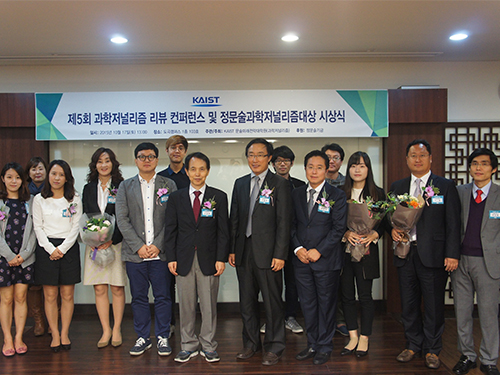 KAIST's Moon Soul Graduate School of Future Strategy Names Recipients of Science Journalism Awards
The Science Journalism Masters Program of the Moon Soul Graduate School of Future Strategy at KAIST named the winners of the 2015 Science Journalism Awards on October 17, 2015. The award ceremony took place at KAIST’s Seoul campus.
The awards were created in 2011 to recognize exemplary journalism that has contributed to the advancement of science and technology in Korea.
This year, the Korean Broadcasting System’s science show called the “Jang Yeong-Sil Show” received the Grand Prize. Yeong-Sil Jang was a Korean scientist and astronomer during the Joseon Dynasty in the 14th century.
A television documentary on challenges facing farm-raised chickens, which was produced by the Munhwa Broadcasting Corporation in Jeonju City, won the TV Award, while news coverage by Dong-A Daily on the outbreak of the Middle East respiratory Syndrome (MERS) in Korea received the Print Award.
After the award ceremony, students and professors of the Science Journalism Program hosted a conference to review and discuss major issues covered by the news media in the past year.
2015.10.15 View 7734
KAIST's Moon Soul Graduate School of Future Strategy Names Recipients of Science Journalism Awards
The Science Journalism Masters Program of the Moon Soul Graduate School of Future Strategy at KAIST named the winners of the 2015 Science Journalism Awards on October 17, 2015. The award ceremony took place at KAIST’s Seoul campus.
The awards were created in 2011 to recognize exemplary journalism that has contributed to the advancement of science and technology in Korea.
This year, the Korean Broadcasting System’s science show called the “Jang Yeong-Sil Show” received the Grand Prize. Yeong-Sil Jang was a Korean scientist and astronomer during the Joseon Dynasty in the 14th century.
A television documentary on challenges facing farm-raised chickens, which was produced by the Munhwa Broadcasting Corporation in Jeonju City, won the TV Award, while news coverage by Dong-A Daily on the outbreak of the Middle East respiratory Syndrome (MERS) in Korea received the Print Award.
After the award ceremony, students and professors of the Science Journalism Program hosted a conference to review and discuss major issues covered by the news media in the past year.
2015.10.15 View 7734 -
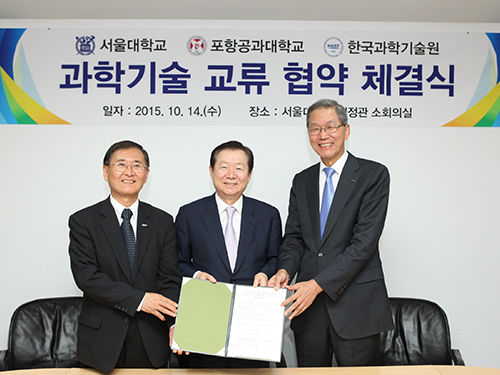 KAIST Teams Up with Korean Universities for MOOCs
KAIST, Seoul National University (SNU), and the Pohang University of Science and Technology (POSTECH) agreed to cooperate in the development of Massive Open Online Courses (MOOCs) for Korean viewers. The agreement ceremony took place at the SNU campus on October 14, 2015.
Under the agreement, professors from all three universities will jointly create and implement online courses on science and engineering by the summer of 2016. The MOOCs will largely consist of basic courses on physics, chemistry, life science, mechanical engineering, and material science. Anyone from a high school student to an adult who is interested in science can take these online courses.
Some of the participating professors will be President Doh-Yeon Kim of POSTECH, Dean Seong-Keun Kim of Natural Sciences College at SNU, Dean Kun-Woo Lee of Engineering College at SNU, Dean Jung-Hoe Kim of Life Science and Bioengineering College at KAIST, Dean Do-Kyung Kim of Academic Affairs at KAIST, Dean Kun-Hong Lee of Engineering College at POSTECH, and Dean Joon-Won Park of Science College at POSTECH.
President Steve Kang of KAIST said,
“Many of Korea’s most distinguished professors in science and engineering will participate in the MOOCs. People, particularly young students aspiring to study science and technology at universities, should definitely take advantage of this opportunity.”
In the picture from left to right is President Steve Kang of KAIST, President Nak-In Sung of Seoul National University, and President Doh-Yeon Kim of Pohang University of Science and Technology.
2015.10.14 View 8660
KAIST Teams Up with Korean Universities for MOOCs
KAIST, Seoul National University (SNU), and the Pohang University of Science and Technology (POSTECH) agreed to cooperate in the development of Massive Open Online Courses (MOOCs) for Korean viewers. The agreement ceremony took place at the SNU campus on October 14, 2015.
Under the agreement, professors from all three universities will jointly create and implement online courses on science and engineering by the summer of 2016. The MOOCs will largely consist of basic courses on physics, chemistry, life science, mechanical engineering, and material science. Anyone from a high school student to an adult who is interested in science can take these online courses.
Some of the participating professors will be President Doh-Yeon Kim of POSTECH, Dean Seong-Keun Kim of Natural Sciences College at SNU, Dean Kun-Woo Lee of Engineering College at SNU, Dean Jung-Hoe Kim of Life Science and Bioengineering College at KAIST, Dean Do-Kyung Kim of Academic Affairs at KAIST, Dean Kun-Hong Lee of Engineering College at POSTECH, and Dean Joon-Won Park of Science College at POSTECH.
President Steve Kang of KAIST said,
“Many of Korea’s most distinguished professors in science and engineering will participate in the MOOCs. People, particularly young students aspiring to study science and technology at universities, should definitely take advantage of this opportunity.”
In the picture from left to right is President Steve Kang of KAIST, President Nak-In Sung of Seoul National University, and President Doh-Yeon Kim of Pohang University of Science and Technology.
2015.10.14 View 8660 -
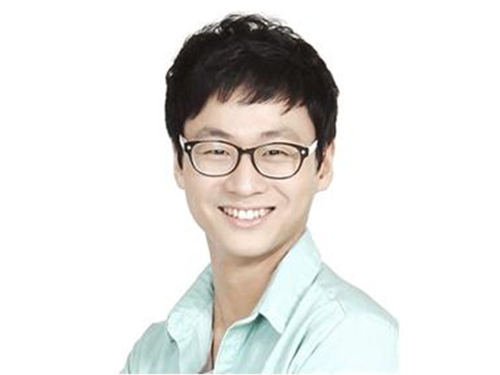 Dr. Hyundoo Hwang Receives a Tenured Position at Monterrey Institute of Technology and Higher Education
Hyundoo Hwang, a former graduate student in the Department of Bio & Brain Engineering at KAIST, has been granted a tenured position at the Monterrey Institute of Technology and Higher Education (ITSEM), Mexico.
Dr. Hwang received his bachelor’s, master’s, and doctoral degree at KAIST and started his professorship at Ulsan National Institute of Science & Technology (UNIST) in Korea. He continued his research in the United States as a professor at Georgia Institute of Technology. He has been acknowledged for the development of an advanced nanotechnology for the diagnosis of rare diseases and research in cell signals. He is one of the leading researchers in an international research project in microelectromechanical systems (MEMS) with participation by researchers from over ten countries. He has been active in commercializing biosensor technology in the U.S. and Mexico.
Since its establishment in 1943, ITSEM has grown to 33 campuses in 25 cities in Mexico. It is the largest university in Latin America with over 90,000 students (47% of its graduate students has oversea research experience). It recruits over 5,000 international students and professors every year.
Dr. Hwang will begin teaching at ITSEM as a professor in the Department of Biomedical Engineering (Ingeniería Biomédica) this fall. He will also conduct research in nano- and micro-technology as a member of Sensors and Devices research group.
Professor Gwang Hyun Cho, head of KAIST's Department of Bio and Brain Engineering said that Dr. Hwang’s tenure professorship at ITSEM demonstrated that the academic program at KAIST—from undergraduate to doctoral—was on par with the international standard. He hoped that more talents from the department would seek academic careers in internationally renowned universities around the world.
2015.08.13 View 7830
Dr. Hyundoo Hwang Receives a Tenured Position at Monterrey Institute of Technology and Higher Education
Hyundoo Hwang, a former graduate student in the Department of Bio & Brain Engineering at KAIST, has been granted a tenured position at the Monterrey Institute of Technology and Higher Education (ITSEM), Mexico.
Dr. Hwang received his bachelor’s, master’s, and doctoral degree at KAIST and started his professorship at Ulsan National Institute of Science & Technology (UNIST) in Korea. He continued his research in the United States as a professor at Georgia Institute of Technology. He has been acknowledged for the development of an advanced nanotechnology for the diagnosis of rare diseases and research in cell signals. He is one of the leading researchers in an international research project in microelectromechanical systems (MEMS) with participation by researchers from over ten countries. He has been active in commercializing biosensor technology in the U.S. and Mexico.
Since its establishment in 1943, ITSEM has grown to 33 campuses in 25 cities in Mexico. It is the largest university in Latin America with over 90,000 students (47% of its graduate students has oversea research experience). It recruits over 5,000 international students and professors every year.
Dr. Hwang will begin teaching at ITSEM as a professor in the Department of Biomedical Engineering (Ingeniería Biomédica) this fall. He will also conduct research in nano- and micro-technology as a member of Sensors and Devices research group.
Professor Gwang Hyun Cho, head of KAIST's Department of Bio and Brain Engineering said that Dr. Hwang’s tenure professorship at ITSEM demonstrated that the academic program at KAIST—from undergraduate to doctoral—was on par with the international standard. He hoped that more talents from the department would seek academic careers in internationally renowned universities around the world.
2015.08.13 View 7830 -
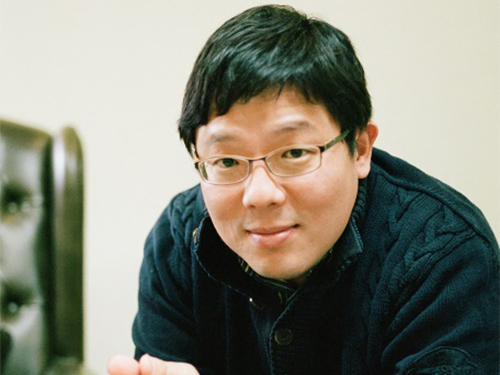 Science and Technology Policy Professor Chihyung Jeon Awarded Rachel Carson Fellowship
KAIST Graduate School of Science and Technology Policy Professor Chihyung Jeon has been awarded the Rachel Carson Fellowship 2015-2016.
Rachel Carson Center for Environment and Society is a research center for environmental humanities and social sciences, supported by the German Federal Ministry of Education and Research. It was founded by Ludwig-Maximilians-Universität, Munich, Germany and the Deutsches Museum as a joint initiative in 2009.
Rachel Carson Center supports researches in humanities and social sciences on the interactions between the environment and the society, following the footsteps of Rachel Cason, who raised awareness on the chemical environmental damage and started global environmental movement through her published book “Silent Spring” in 1962.
The center is awarding Rachel Carson Fellowships to established researchers to fund their writing and promote exchange of research. This year, 31 fellowships were awarded.
Professor Jeon will conduct research on "A Dredged Nation: The Four Rivers Restoration Project and the Envirotechnical Transformation of South Korea" and will also hold an additional post of International Curatorial Fellow at the Deutsches Museum.
2015.06.11 View 11487
Science and Technology Policy Professor Chihyung Jeon Awarded Rachel Carson Fellowship
KAIST Graduate School of Science and Technology Policy Professor Chihyung Jeon has been awarded the Rachel Carson Fellowship 2015-2016.
Rachel Carson Center for Environment and Society is a research center for environmental humanities and social sciences, supported by the German Federal Ministry of Education and Research. It was founded by Ludwig-Maximilians-Universität, Munich, Germany and the Deutsches Museum as a joint initiative in 2009.
Rachel Carson Center supports researches in humanities and social sciences on the interactions between the environment and the society, following the footsteps of Rachel Cason, who raised awareness on the chemical environmental damage and started global environmental movement through her published book “Silent Spring” in 1962.
The center is awarding Rachel Carson Fellowships to established researchers to fund their writing and promote exchange of research. This year, 31 fellowships were awarded.
Professor Jeon will conduct research on "A Dredged Nation: The Four Rivers Restoration Project and the Envirotechnical Transformation of South Korea" and will also hold an additional post of International Curatorial Fellow at the Deutsches Museum.
2015.06.11 View 11487 -
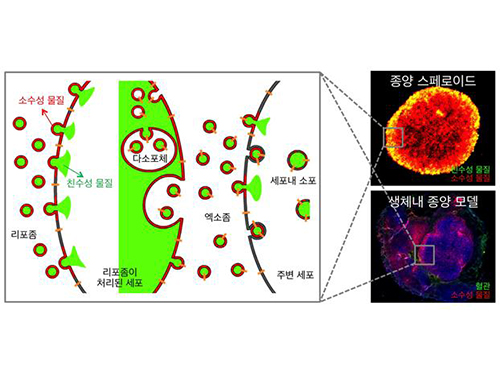 Anti-Cancer Therapy Delivering Drug to an Entire Tumor Developed
KAIST’s Department of Bio and Brain Engineering Professor Ji-Ho Park and his team successfully developed a new highly efficacious anti-cancer nanotechnology by delivering anti-cancer drugs uniformly to an entire tumor. Their research results were published in Nano Letters online on March 31, 2015.
To treat inoperable tumors, anti-cancer medicine is commonly used. However, efficient drug delivery to tumor cells is often difficult, treating an entire tumor with drugs even more so.
Using the existing drug delivery systems, including nanotechnology, a drug can be delivered only to tumor cells near blood vessels, leaving cells at the heart of a tumor intact. Since most drugs are injected into the bloodstream, tumor recurrence post medication is frequent.
Therefore, the team used liposomes that can fuse to the cell membrane and enter the cell. Once inside liposomes the drug can travel into the bloodstream, enter tumor cells near blood vessels, where they are loaded to exosomes, which are naturally occurring nanoparticles in the body. Since exosomes can travel between cells, the drug can be delivered efficiently into inner cells of the tumor.
Exosomes, which are secreted by cells that exist in the tumor microenvironment, is known to have an important role in tumor progression and metastasis since they transfer biological materials between cells. The research team started the investigation recognizing the possibility of delivering the anti-cancer drug to the entire tumor using exosomes.
The team injected the light-sensitive anti-cancer drug using their new delivery technique into experimental mice. The researchers applied light to the tumor site to activate the anti-cancer treatment and analyzed a tissue sample. They observed the effects of the anti-cancer drug in the entire tumor tissue.
The team’s results establish a ground-breaking foothold in drug delivery technology development that can be tailored to specific diseases by understanding its microenvironment. The work paves the way to more effective drug delivery systems for many chronic diseases, including cancer tumors that were difficult to treat due to the inability to penetrate deep into the tissue.
The team is currently conducting experiments with other anti-cancer drugs, which are being developed by pharmaceutical companies, using their tumor-penetrating drug delivery nanotechnology, to identify its effects on malignant tumors.
Professor Park said, “This research is the first to apply biological nanoparticles, exosomes that are continuously secreted and can transfer materials to neighboring cells, to deliver drugs directly to the heart of tumor.”
Picture: Incorporation of hydrophilic and hydrophobic compounds into membrane vesicles by engineering the parental cells via synthetic liposomes.
2015.04.07 View 12925
Anti-Cancer Therapy Delivering Drug to an Entire Tumor Developed
KAIST’s Department of Bio and Brain Engineering Professor Ji-Ho Park and his team successfully developed a new highly efficacious anti-cancer nanotechnology by delivering anti-cancer drugs uniformly to an entire tumor. Their research results were published in Nano Letters online on March 31, 2015.
To treat inoperable tumors, anti-cancer medicine is commonly used. However, efficient drug delivery to tumor cells is often difficult, treating an entire tumor with drugs even more so.
Using the existing drug delivery systems, including nanotechnology, a drug can be delivered only to tumor cells near blood vessels, leaving cells at the heart of a tumor intact. Since most drugs are injected into the bloodstream, tumor recurrence post medication is frequent.
Therefore, the team used liposomes that can fuse to the cell membrane and enter the cell. Once inside liposomes the drug can travel into the bloodstream, enter tumor cells near blood vessels, where they are loaded to exosomes, which are naturally occurring nanoparticles in the body. Since exosomes can travel between cells, the drug can be delivered efficiently into inner cells of the tumor.
Exosomes, which are secreted by cells that exist in the tumor microenvironment, is known to have an important role in tumor progression and metastasis since they transfer biological materials between cells. The research team started the investigation recognizing the possibility of delivering the anti-cancer drug to the entire tumor using exosomes.
The team injected the light-sensitive anti-cancer drug using their new delivery technique into experimental mice. The researchers applied light to the tumor site to activate the anti-cancer treatment and analyzed a tissue sample. They observed the effects of the anti-cancer drug in the entire tumor tissue.
The team’s results establish a ground-breaking foothold in drug delivery technology development that can be tailored to specific diseases by understanding its microenvironment. The work paves the way to more effective drug delivery systems for many chronic diseases, including cancer tumors that were difficult to treat due to the inability to penetrate deep into the tissue.
The team is currently conducting experiments with other anti-cancer drugs, which are being developed by pharmaceutical companies, using their tumor-penetrating drug delivery nanotechnology, to identify its effects on malignant tumors.
Professor Park said, “This research is the first to apply biological nanoparticles, exosomes that are continuously secreted and can transfer materials to neighboring cells, to deliver drugs directly to the heart of tumor.”
Picture: Incorporation of hydrophilic and hydrophobic compounds into membrane vesicles by engineering the parental cells via synthetic liposomes.
2015.04.07 View 12925 -
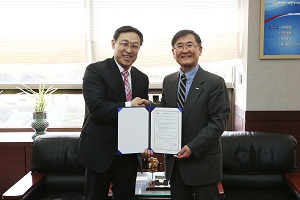 KAIST & the Classic 500 Co Sign for Mobile Healthcare Research
KAIST and The Classic 500 Co., Ltd., an elder care provider based in Seoul, signed a memorandum of understanding to expand medical services by cooperating on the research of medical services and IT on March 24, 2015.
Twenty people from the two institutions, including President Steve Kang, Dong-Hyun Bak, CEO of The Classic 500 and Mun-Sul Jeong, a former KAIST Chairman of the Board, attended the signing ceremony.
Under the agreement, the two institutions will cooperate on mobile healthcare research and the development of a telemedicine system. They will also research and develop a system to better serve society with medical services.
The Classic 500, established by Konkuk University in Korea, provides nursing care services and assisted living facilities for senior citizens.
2015.03.26 View 9627
KAIST & the Classic 500 Co Sign for Mobile Healthcare Research
KAIST and The Classic 500 Co., Ltd., an elder care provider based in Seoul, signed a memorandum of understanding to expand medical services by cooperating on the research of medical services and IT on March 24, 2015.
Twenty people from the two institutions, including President Steve Kang, Dong-Hyun Bak, CEO of The Classic 500 and Mun-Sul Jeong, a former KAIST Chairman of the Board, attended the signing ceremony.
Under the agreement, the two institutions will cooperate on mobile healthcare research and the development of a telemedicine system. They will also research and develop a system to better serve society with medical services.
The Classic 500, established by Konkuk University in Korea, provides nursing care services and assisted living facilities for senior citizens.
2015.03.26 View 9627 -
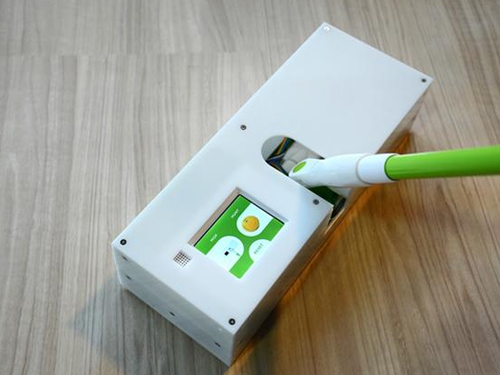 A KAIST Student Team Wins the ACM UIST 2014 Student Innovation Contest
A KAIST team consisted of students from the Departments of Industrial Design and Computer Science participated in the ACM UIST 2014 Student Innovation Contest and received 1st Prize in the category of People’s Choice.
The Association for Computing Machinery (ACM) Symposium on User Interface Software and Technology (UIST) is an international forum to promote innovations in human-computer interfaces, which takes place annually and is sponsored by ACM Special Interest Groups on Computer-Human Interaction (SIGCHI) and Computer Graphics (SIGGRAPH). The ACM UIST conference brings together professionals in the fields of graphical and web-user interfaces, tangible and ubiquitous computing, virtual and augmented reality, multimedia, and input and output devices.
The Student Innovation Contest has been held during the UIST conference since 2009 to innovate new interactions on state-of-the-art hardware. The participating students were given with the hardware platform to build on—this year, it was Kinoma Create, a JavaScript-powered construction kit that allows makers, professional product designers, and web developers to create personal projects, consumer electronics, and "Internet of Things" prototypes. Contestants demonstrated their creations on household interfaces, and two winners in each of three categories -- Most Creative, Most Useful, and the People’s Choice -- were awarded.
Utilizing Kinoma Create, which came with a built-in touchscreen, WiFi, Bluetooth, a front-facing sensor connector, and a 50-pin rear sensor dock, the KAIST team developed a “smart mop,” transforming the irksome task of cleaning into a fun game. The smart mop identifies target dirt and shows its location on the display built in the rod of a mop. If the user turns on a game mode, then winning scores are gained wherever the target dirt is cleaned.
The People’s Choice award was decided by conference attendees, and they voted the smart mop as their most favorite project.
Professor Tek-Jin Nam of the Department of Industrial Design at KAIST, who advised the students, said, "A total of 24 teams from such prestigious universities as Carnegie Mellon University, Georgia Institute of Technology, and the University of Tokyo joined the contest, and we are pleased with the good results. Many people, in fact, praised the integration of creativity and technical excellence our have shown through the smart mop.”
Team KAIST: pictured from right to left, Sun-Jun Kim, Se-Jin Kim, and Han-Jong Kim
The Smart Mop can clean the floor and offer users a fun game.
2014.11.12 View 12705
A KAIST Student Team Wins the ACM UIST 2014 Student Innovation Contest
A KAIST team consisted of students from the Departments of Industrial Design and Computer Science participated in the ACM UIST 2014 Student Innovation Contest and received 1st Prize in the category of People’s Choice.
The Association for Computing Machinery (ACM) Symposium on User Interface Software and Technology (UIST) is an international forum to promote innovations in human-computer interfaces, which takes place annually and is sponsored by ACM Special Interest Groups on Computer-Human Interaction (SIGCHI) and Computer Graphics (SIGGRAPH). The ACM UIST conference brings together professionals in the fields of graphical and web-user interfaces, tangible and ubiquitous computing, virtual and augmented reality, multimedia, and input and output devices.
The Student Innovation Contest has been held during the UIST conference since 2009 to innovate new interactions on state-of-the-art hardware. The participating students were given with the hardware platform to build on—this year, it was Kinoma Create, a JavaScript-powered construction kit that allows makers, professional product designers, and web developers to create personal projects, consumer electronics, and "Internet of Things" prototypes. Contestants demonstrated their creations on household interfaces, and two winners in each of three categories -- Most Creative, Most Useful, and the People’s Choice -- were awarded.
Utilizing Kinoma Create, which came with a built-in touchscreen, WiFi, Bluetooth, a front-facing sensor connector, and a 50-pin rear sensor dock, the KAIST team developed a “smart mop,” transforming the irksome task of cleaning into a fun game. The smart mop identifies target dirt and shows its location on the display built in the rod of a mop. If the user turns on a game mode, then winning scores are gained wherever the target dirt is cleaned.
The People’s Choice award was decided by conference attendees, and they voted the smart mop as their most favorite project.
Professor Tek-Jin Nam of the Department of Industrial Design at KAIST, who advised the students, said, "A total of 24 teams from such prestigious universities as Carnegie Mellon University, Georgia Institute of Technology, and the University of Tokyo joined the contest, and we are pleased with the good results. Many people, in fact, praised the integration of creativity and technical excellence our have shown through the smart mop.”
Team KAIST: pictured from right to left, Sun-Jun Kim, Se-Jin Kim, and Han-Jong Kim
The Smart Mop can clean the floor and offer users a fun game.
2014.11.12 View 12705 -
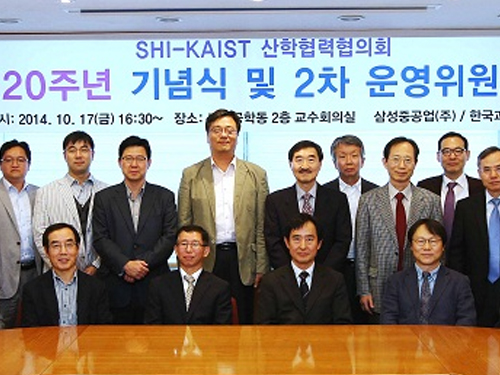 KAIST and Samsung Heavy Industries Celebrate 20 Years of Cooperation
KAIST and Samsung Heavy Industries (SHI) celebrated the twentieth anniversary of their university-industry cooperation in shipbuilding and ocean technology research. Established in 1995, the cooperation has remained steadfast for two decades, even times when Korea suffered gravely from its financial crisis in late 1990s.
A ceremony to commemorate the cooperation took place at the Mechanical Engineering Building on October 17, 2014. About thirty distinguished guests including the Head of the Department of Mechanical Engineering, Professor Choong-Sik Bae, and the chief engineer of SHI Marine Research Institute, Dr. Jong-Soo Seo, participated in the ceremony.
The cooperation programs included appointing advisory professors for technological support, implementing business-based academic courses, offering university-industry wide open lectures, opening regular courses for auditing, and finding possible joint researches. Through this cooperation, Samsung has secured technologies needed for industry, and KAIST has produced students who have real-world experience in industrial fields.
Twenty years of cooperation has produced shining results by running various programs such as technological advice, special lectures, small-scale research projects, consignment research projects, and courses for research and design personnel.
For example, what started as a small-scale research project with USD 4,800 in funding, the LNG (Liquefied Natural Gas) related research has grown into a large-scale research project with a total of USD 2.85 million in funding. As a result, they developed a secondary barrier for LNG carriers which was recognized by Lloyd‘s Register. Their research eventually lowered ship manufacturing costs tremendously.
In 2003, the cooperation project received the presidential citation from the University-Industry Cooperation Competition organized by the Federation of Korean Industries.
KAIST and SHI planned to increase their cooperation to make it Korea’s leading university-industry cooperation program.
Professor Bae said, “Our programs to focus on solving industrial problems have turned out quite successful.” He emphasized that “for this reason, the cooperation even continued during the Asian financial crisis in 1997.”
He added, “By expanding the current cooperation, we aim to make it an exemplary program that contributes to Korea’s shipbuilding and ocean plant industries.”
2014.10.21 View 10874
KAIST and Samsung Heavy Industries Celebrate 20 Years of Cooperation
KAIST and Samsung Heavy Industries (SHI) celebrated the twentieth anniversary of their university-industry cooperation in shipbuilding and ocean technology research. Established in 1995, the cooperation has remained steadfast for two decades, even times when Korea suffered gravely from its financial crisis in late 1990s.
A ceremony to commemorate the cooperation took place at the Mechanical Engineering Building on October 17, 2014. About thirty distinguished guests including the Head of the Department of Mechanical Engineering, Professor Choong-Sik Bae, and the chief engineer of SHI Marine Research Institute, Dr. Jong-Soo Seo, participated in the ceremony.
The cooperation programs included appointing advisory professors for technological support, implementing business-based academic courses, offering university-industry wide open lectures, opening regular courses for auditing, and finding possible joint researches. Through this cooperation, Samsung has secured technologies needed for industry, and KAIST has produced students who have real-world experience in industrial fields.
Twenty years of cooperation has produced shining results by running various programs such as technological advice, special lectures, small-scale research projects, consignment research projects, and courses for research and design personnel.
For example, what started as a small-scale research project with USD 4,800 in funding, the LNG (Liquefied Natural Gas) related research has grown into a large-scale research project with a total of USD 2.85 million in funding. As a result, they developed a secondary barrier for LNG carriers which was recognized by Lloyd‘s Register. Their research eventually lowered ship manufacturing costs tremendously.
In 2003, the cooperation project received the presidential citation from the University-Industry Cooperation Competition organized by the Federation of Korean Industries.
KAIST and SHI planned to increase their cooperation to make it Korea’s leading university-industry cooperation program.
Professor Bae said, “Our programs to focus on solving industrial problems have turned out quite successful.” He emphasized that “for this reason, the cooperation even continued during the Asian financial crisis in 1997.”
He added, “By expanding the current cooperation, we aim to make it an exemplary program that contributes to Korea’s shipbuilding and ocean plant industries.”
2014.10.21 View 10874 -
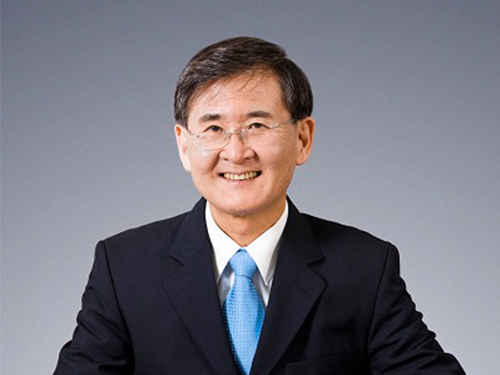 President of KAIST Becomes an International Board Member of Moscow Institute of Physics and Technology in Russia
President Sung-Mo “Steve” Kang of KAIST has been appointed a member of the International Board of the Moscow Institute of Physics and Technology (MIPT) in 2014, a leading Russian university specializing in theoretical and applied physics, mathematics, and related science and technology disciplines.
President Kang is the only scientist from Asia to become the latest member of the MIPT International Board. Consisting of 11 highly regarded scientists and scholars from all around the world, such as Professor Carlo Rubbia, a Nobel laureate in physics in 1984, President Alexander F. Andreev of the Kapitsa Institute for Physical Problems, President Ralph Eichler of the Zurich Federal Institute of Technology, and President Jaques Biot of the École Polytechnique Paris. Currently, President Leo Rafael Raif of MIT chairs the Board.
MIPT created the International Board (http://mipt.ru/en/about/general/international-board/) in 2013 to promote collaboration in international research and educational programs as well as to enhance its global visibility in the international community.
MIPT was established in 1946 by a group of prominent Soviet scientists including Pyotr Kapitsa, a Nobel laureate in physics in 1978, and was approved later in 1951 by the government of the former Soviet Union as a state university. Often referred as the “Russian MIT,” MIPT has earned international and domestic recognition through its unique educational system, providing students with opportunities for rigorous education in fundamental science and extensive research at leading research institutions of the Russian Academy of Sciences.
2014.09.28 View 7228
President of KAIST Becomes an International Board Member of Moscow Institute of Physics and Technology in Russia
President Sung-Mo “Steve” Kang of KAIST has been appointed a member of the International Board of the Moscow Institute of Physics and Technology (MIPT) in 2014, a leading Russian university specializing in theoretical and applied physics, mathematics, and related science and technology disciplines.
President Kang is the only scientist from Asia to become the latest member of the MIPT International Board. Consisting of 11 highly regarded scientists and scholars from all around the world, such as Professor Carlo Rubbia, a Nobel laureate in physics in 1984, President Alexander F. Andreev of the Kapitsa Institute for Physical Problems, President Ralph Eichler of the Zurich Federal Institute of Technology, and President Jaques Biot of the École Polytechnique Paris. Currently, President Leo Rafael Raif of MIT chairs the Board.
MIPT created the International Board (http://mipt.ru/en/about/general/international-board/) in 2013 to promote collaboration in international research and educational programs as well as to enhance its global visibility in the international community.
MIPT was established in 1946 by a group of prominent Soviet scientists including Pyotr Kapitsa, a Nobel laureate in physics in 1978, and was approved later in 1951 by the government of the former Soviet Union as a state university. Often referred as the “Russian MIT,” MIPT has earned international and domestic recognition through its unique educational system, providing students with opportunities for rigorous education in fundamental science and extensive research at leading research institutions of the Russian Academy of Sciences.
2014.09.28 View 7228